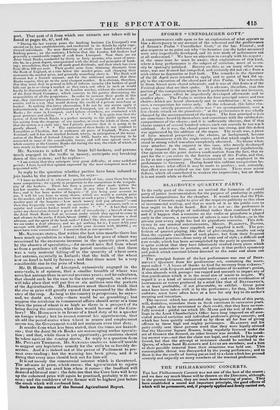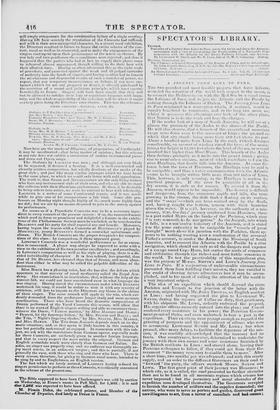THE PHILHARMONIC CONCERTS.
THE last Philharmonic Concert was not one of the best of the season; and we dare say much blame will be thrown on the Directors, although, in the present instance, they are much more deserving of praise. They have established a sound and important principle, the good effects of which will be permanent, and, if properly applied and firmly carried out, will amply compensate for the comparative failure of a single evening. Having felt how severely the reputation of the Concerts had suffered, and with it their own managerial character, by a recent vocal exhibition, the Directors resolved in future to frame the entire scheme of the con- cert, vocal as well as instrumental, and to make the engagements of the singers contingent upon their perfurmanee of the music so chosen. By one lady and two gentlemen these conditions were rejected ; and thus it happened that the parties who had at last to supply their places came to rehearsal almost unprepared, though willing to do their best with their allotted duty. Having so often advoeuted this as the right mode of procedure, and protested against the weak and ill-judged surrender of authority into the hands of singers, and having so often had to lament the mischievous and disgraceful results of such a transfer of power, we repeat, that any temporary inconvenience or failure, if any were sus- tained (which we are not prepared to deny), is cheaply purchased by the assertion of a sound and judicious principle, which must operate beneficially in future. Singeis will have been taught that they will riot be allowed to indulge their hay or capricious humours with itnpu- mity, and the whole responsibilty of the scat thin will lie where it ought —every piece being the Ithectors' own choice. This was the scheme— FIFTH CON(' ST— tiN OAY, APRIL '25.
ACT 1.
Sinfonia. in E e d (first time of Performance)
Air, Mi•,4 " Ave Mai Lt" ('oncerto, Pianoforte 1 MS.) in C Minor, Mr. W. S. IIENNE'l r
Steno, M r..I !SFr:NETT, " Ali sorrida, amico" (.1cswouirt) Overture, Faniaka LACHNER. (rats ltlp:s t.
I.
SPURR. ClIEKUKIN1.
ACT 11.
Sinfonia. in D
Scoria. Mrs. 11. R. Bnotoc, " Ah pertido" BEFTIIOVEN.
COReCV/0, Giulia, M. LIPINSKI SpOUR.
Te:zetto. Mrs. II. It. litsaoc. iss limit and Mr..1. BEN-
NET " Qual C.111113 RI SII1/1" (.1r.owneks) ... Overture, Preriusa C. M. cis WEnEn. Leader, Mr. F. Ca ar sit –Conductor, Mr. T. caoas.
Nowhere are the marks of diligence, of preparation, of forethought : it may lie misdirected—that being matter of opinion ; but this scheme at any rate does not exhibit a succession of routine instrumental pieces and worn-out Opera songs.
The SinfOnia by Lai:tiara was new ; and although not very likely to be repeated, it deserved a hearing. It is a well-constructed and cleverly-written composition, but wholly destitute of the marks of the great style ; and just like many similar attempts which we have heard in the seine place, to which we could only listen with cold approbation. The truth is, that Spotlit and 11 Exusa.ssousi are the only living writers who have any instrumental style of their own, and who arc able to stand the collision with their illustrious predecessors. If, then, it be desirable to bring others into notice, we must be content to bear with inferiority. LACIINER is a writer of sonic. Continental repute, mid it was worth while to give one of his compositions a fair trial. Some able pro- fessors on Monday night thought highly of it—much more highly than we did ; but we are by no means disposed to join in the outcry against its performance.
Its seems as if a Pianoforte Concerto was to be a necessary ingre- dient in every concert of the present season : if so, the concerted music which used to form so prominent and delightful a feature in the exhibi- tions of the Philharmonic Society must be excluded, or be transferred to BLAGROVE and hi 3 party for their especial use and benefit. Moreover, having begun the season with a Concerto of BEETHOVEN'S played by Moscnstss, young Bra:NEI-es formed a somewhat unfortunate anti- climax. The British Concerts are the proper receptacles for composi- tions of this class : by comparison, it there appeared great.
LIPINSKI'S Concerto was a wonderful performance as far as execu- tion is concerned. A player may always be expected to write with a view to the exhibition of his own peculiar excellencies ; and accordingly, in LIPINSKI'S composition as well as his style of playing, there is a de- cided individuality of character. It is less refined, less graceful, than that of De Btarior, less elevated than that of SPOIIR, and more abun- dant than either in what may be called the palpable difficulties of the instrument. •
Miss BIRCH has a pleasing voice, but she has also the defects which appertain to that nursery of vocal mediocrity called the Royal Aca- demy. Her enunciation is so inarticulate, that, without the help of the concert-bill, we could not have ascertained even in what language she was singing. Having stared the circumstances under which Ili:Ns:err undertook his song, it would be unfair to visit it with any severity of criticism, still less to impute to the Directors any blame in the choice of their singer. The same remark will apply to the trio, which evi- dently demanded from the performers longer study and more accurate combination. Those who have heard the dramatic compositions of SPOHR performed at the Vocal Concerts this season, will tallow that there is no want of English singers willing and able to encounter them : witness the Duets, "Fairest maiden," by Miss MASSON and Hoses; " Dearest, let thy footsteps follow," by Mrs. SEGUIN and Mune; and the Trio, " Night's lingering shades," by Mrs. SEGUIN, Miss MassoN, and Miss HAWES. The Trio from Jessondo depends much on its dra- matic situation; and, as that opera is little known in this country, it was but partially understood or enjoyed. In connexion with this sub- ject, we ask why the translations from German operas. especially made for these Concerts, are uniformly given in another foreign language, and that in every respect the most unlike the original. German and English assimilate much more closely than German and Italian. Be- sides, no singer can properly sing, and no audience can thoroughly en- joy vocal music, in an unknown tongue ; and this is partially, if not generally the case, with those who sing and those who hear. There is every reason, therefore, for giving to German vocal music, intended to be sung by and to Englishmen, an English version. The fact which we lately noticed, of LAPORTE having refused his singers permission to perform at these Concerts, was officially announced in the scheme of the present one.



























 Previous page
Previous page